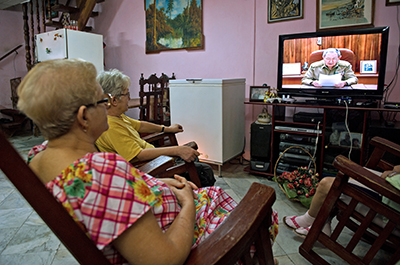Throughout the years, the Cuban government has justified the imprisonment of independent journalists on charges that they were acting against the State’s sovereignty at the behest of the United States. During the so-called Black Spring in March 2003, when the government then led by President Fidel Castro launched a massive crackdown against dissidents while the world’s attention was focused on the U.S.-led invasion of Iraq, a total of 29 independent journalists were sentenced to prison terms of up to 27 years. During court proceedings, it became an established fact that those journalists were charged with destabilizing the nation because of their work for foreign media outlets. They were punished for being “mercenaries” at the service of a foreign power (namely, the United States).
The U.S. government has supported Cuban civil society through material assistance and training. The U.S. Agency for International Development has developed action programs to generate solidarity with the island’s human rights activists and to give voice to the independent press. But some of these programs, such as a recently revealed one to promote hip-hop music, have been considered attempts by the U.S. government to undermine the Castro brothers. The strong U.S. backing of Cuban civil society and independent press has contributed to the Cuban government’s strategy, which is bent on characterizing dissidents as spies working at the behest of the “Empire.”
Ever since Wednesday’s historical announcement about the restoration of diplomatic ties between the U.S. and Cuba, the argument used by Havana to imprison, harass, and intimidate independent journalists has lost its foundation. Even the smear campaigns suffered by most dissidents–including prominent blogger Yoani Sánchez–that they act as CIA or State Department covert agents, or that they are simply lackeys for the U.S., now appear outdated.
The consequences of such an unprecedented turn in the relationship between both countries after 50 years of Cold War could be promising for human rights and freedom of expression. As a result, journalists should be able to do their jobs without so many restrictions, without the ongoing threat of being jailed for merely reporting and expressing critical opinions, and with the possibility of having access to the Internet without filters, obstacles, or prohibitive costs.
But the reality is that Cuba remains one of the most restrictive nations for the press. An independent writer and blogger, Ángel Santiesteban Prats, has been jailed since February 2013 and is serving a five-year prison sentence in retaliation for his criticism of the government. All domestic media outlets are controlled by the Communist Party, which recognizes freedom of the press “only in keeping with the goals of the Socialist society.” All independent journalists and bloggers write for websites that are hosted abroad and are updated through costly hotel connections or public computers at foreign embassies in Havana.
Changes won’t happen overnight. Putting an end to such a restrictive and archaic system will require Cuba’s unavoidable commitment to ratifying and implementing the international human rights agreements that it has signed in order to guarantee freedom of expression and information, including Internet access, the unconditional release of all imprisoned journalists, and the dismantling of an obsolete legal framework that punishes any kind of independent journalism with penalties including prison terms.
Two years after the triumph of the Cuban Revolution, Fidel Castro set the limits for freedom of the press in Cuba with an often cited quote: “Within the Revolution, everything; outside of the Revolution, nothing.” In this new scenario, Cuba will need to reinvent itself but, above all, it will need to accept that the right to freedom of expression is inherent to all human beings, and not a gift granted by the State.
EDITOR’S NOTEThis commentary originally appeared in Spanish in the Argentine daily La Nación, on December 20.
